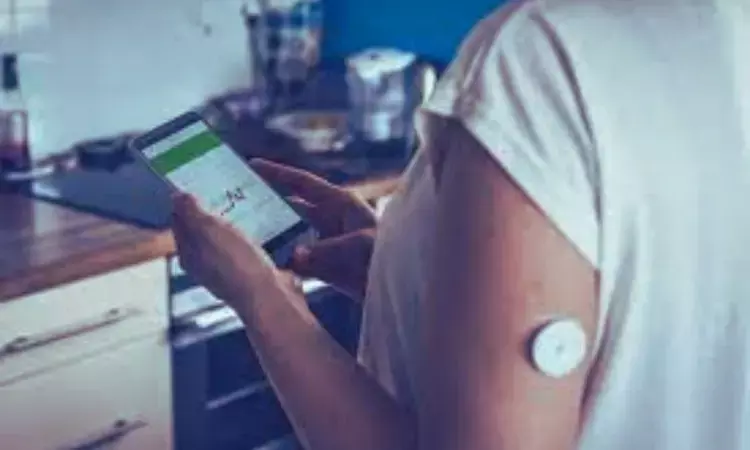- Home
- Medical news & Guidelines
- Anesthesiology
- Cardiology and CTVS
- Critical Care
- Dentistry
- Dermatology
- Diabetes and Endocrinology
- ENT
- Gastroenterology
- Medicine
- Nephrology
- Neurology
- Obstretics-Gynaecology
- Oncology
- Ophthalmology
- Orthopaedics
- Pediatrics-Neonatology
- Psychiatry
- Pulmonology
- Radiology
- Surgery
- Urology
- Laboratory Medicine
- Diet
- Nursing
- Paramedical
- Physiotherapy
- Health news
- Fact Check
- Bone Health Fact Check
- Brain Health Fact Check
- Cancer Related Fact Check
- Child Care Fact Check
- Dental and oral health fact check
- Diabetes and metabolic health fact check
- Diet and Nutrition Fact Check
- Eye and ENT Care Fact Check
- Fitness fact check
- Gut health fact check
- Heart health fact check
- Kidney health fact check
- Medical education fact check
- Men's health fact check
- Respiratory fact check
- Skin and hair care fact check
- Vaccine and Immunization fact check
- Women's health fact check
- AYUSH
- State News
- Andaman and Nicobar Islands
- Andhra Pradesh
- Arunachal Pradesh
- Assam
- Bihar
- Chandigarh
- Chattisgarh
- Dadra and Nagar Haveli
- Daman and Diu
- Delhi
- Goa
- Gujarat
- Haryana
- Himachal Pradesh
- Jammu & Kashmir
- Jharkhand
- Karnataka
- Kerala
- Ladakh
- Lakshadweep
- Madhya Pradesh
- Maharashtra
- Manipur
- Meghalaya
- Mizoram
- Nagaland
- Odisha
- Puducherry
- Punjab
- Rajasthan
- Sikkim
- Tamil Nadu
- Telangana
- Tripura
- Uttar Pradesh
- Uttrakhand
- West Bengal
- Medical Education
- Industry
Transforming Diabetes Management: Continuous Ketone Monitoring Offers New Hope for DKA Prevention, Study

Australia: In a recent study published in Diabetes, Obesity and Metabolism, the researchers present an innovative device that has the potential to be integrated into standard care, particularly for individuals with type 1 diabetes (T1D).
The study revealed that continuous ketone monitoring (CKM) is poised to revolutionize T1D management, offering significant benefits for patients navigating this complex condition. As technology evolves, the integration of CKM into routine care represents a promising advancement to address the specific needs of individuals living with T1D.
"By alleviating the demands of care and improving situational awareness—especially if accomplished with minimal additional cost—we propose that continuous ketone measurement is a natural advancement in the management of type 1 diabetes, enhancing safety in self-monitoring for individuals living with the condition," the researchers wrote.
Historically, diabetes management has focused primarily on glucose levels, given their potential for rapid and dangerous fluctuations. High blood sugar levels can lead to severe complications, necessitating constant vigilance. However, ketones—byproducts of fat metabolism—are crucial for monitoring diabetic ketoacidosis (DKA), a serious and potentially life-threatening condition that can occur when insulin levels are insufficient.
David N. O'Neal, Department of Medicine, University of Melbourne, Melbourne, Victoria, Australia, and colleagues emphasize that early detection of ketosis is essential for preventing and managing DKA. Currently, individuals with diabetes typically measure ketones through capillary blood or urine tests. However, these methods have drawbacks, including the need to carry testing strips that have a limited shelf life and the requirement for users to actively initiate the testing process.
Recent studies have demonstrated the feasibility of CKM using a sensor inserted subcutaneously that measures ketones in interstitial fluid through an enzymatic electrochemical reaction. This technology allows for ketone readings to be updated every five minutes.
In the future, the researchers anticipate that commercial devices will include alarms connected to standardized thresholds and trend indicators. To reduce the burden on users, it is essential that CKM functionality be integrated with other glucose management tools, such as continuous glucose monitors and insulin pumps.
They advocate for the availability of CKM for all individuals at risk of diabetic ketoacidosis recommending that these devices be worn continuously. Those who may benefit the most include individuals with type 1 diabetes, pregnant women, patients on sodium-glucose co-transporter (SGLT) inhibitors that increase the risk of DKA, those with a history of recurrent DKA, individuals engaging in high-intensity exercise, and those who are socially or geographically isolated or following low-carbohydrate diets.
The authors suggest that by providing continuous ketone profiles, these devices will offer crucial clinical insights that have been previously unavailable to people living with diabetes and their healthcare professionals.
"Additional research is necessary to identify the most effective responses for users based on continuous ketone monitoring data and to evaluate how the use of continuous ketone monitors affects hospitalizations related to diabetic ketoacidosis," they concluded.
Reference:
Kong YW, Morrison D, Lu JC, Lee MH, Jenkins AJ, O'Neal DN. Continuous ketone monitoring: Exciting implications for clinical practice. Diabetes Obes Metab. 2024 Sep 24. doi: 10.1111/dom.15921. Epub ahead of print. PMID: 39314201.
Dr Kamal Kant Kohli-MBBS, DTCD- a chest specialist with more than 30 years of practice and a flair for writing clinical articles, Dr Kamal Kant Kohli joined Medical Dialogues as a Chief Editor of Medical News. Besides writing articles, as an editor, he proofreads and verifies all the medical content published on Medical Dialogues including those coming from journals, studies,medical conferences,guidelines etc. Email: drkohli@medicaldialogues.in. Contact no. 011-43720751


